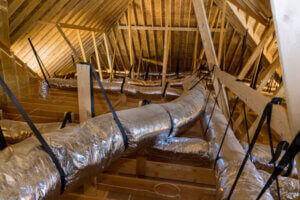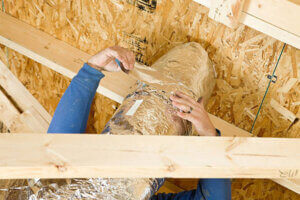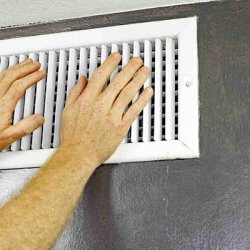
Most people don’t think about their air ducts until there is a problem. But, did you know that your air ducts play a significant role in the overall comfort of your home? As such, it is important that your air ducts are properly sealed and insulated to prevent air leaks and other problems. Read on to learn more about the importance of air duct insulation.
To have the experts at Galmiche & Sons check your air ducts and ensure proper insulation for your system, call or contact our heating and air conditioning experts online or by phone today. Serving St. Louis since 1950, we are a trusted HVAC company for home and business owners throughout the area.
What Is Air Duct Insulation?
Air duct insulation is simply insulation that is placed around your air ducts. The insulation helps to keep the air in your ductwork from escaping as well as provides an insulated layer ensuring that conditioned air stays as hot or cold as it should as it is moved throughout your home. The most common type of insulation used for air ducts is fiberglass insulation. This type of insulation is effective and relatively inexpensive.
Why Air Duct Insulation Is Important?
According to the U.S. Department of Energy, about 30 percent of the energy used to heat and cool a typical home is wasted because of poorly insulated or leaky ductwork. Air duct insulation will help to keep your home at a consistent temperature by ensuring that the heated or cooled air maintains its temperature. This is especially important in the summer and winter when extreme temperatures can make your home uncomfortable.
This insulation offers a number of additional benefits as well:
- Energy savings: In addition to making your home more comfortable, air duct insulation can also help to reduce your energy bills. Leaky ducts, according to the Department of Energy, reduce the efficiency of your residential heating and cooling systems by 20 percent. When you optimize air duct insulation, your HVAC system stays efficient.
- Improved indoor air quality: One of the most important benefits of air duct insulation is improved air quality. Dust and fumes can enter a poorly insulated duct system causing allergies or triggering respiratory illnesses. Sealing ducts will ensure harmful particles do not enter your home through the ducts.
- Quieter operation: Another benefit of air duct insulation is that it can help to reduce the amount of noise that comes from your ductwork. If you have ever heard a loud banging noise coming from your vents, it is likely caused by air ducts that are not properly insulated.
- Extended system life: Air duct insulation can help to extend the life of your HVAC system as well. When your ductwork is properly insulated, it will require less energy to heat and cool your home. This means that your HVAC system will not have to work as hard, which can help to extend its life.
How To Know If Your Air Duct Insulation Is Inadequate?

Here are four signs that indicate you need to add insulation to your air ducts:
- Your home is not as comfortable as it used to be and your home feels stuffy or drafty
- Your energy bills have been steadily increasing
- You hear strange noises coming from your vents that can be caused by airflow restrictions or by metal ductwork rubbing together
- You see dust or debris coming from your vents that can mean that there are gaps or holes in your air ducts, which can happen if the ductwork is old or improperly installed
Contact Galmiche & Sons to Learn More
If you are not sure whether or not your air ducts are properly insulated, contact Galmiche & Sons for a professional inspection. As the leading HVAC professionals in St. Louis, we use cutting-edge tools to determine where the faulty ductwork is before insulating and fixing it. Give us a call or contact us online to schedule an inspection today.









